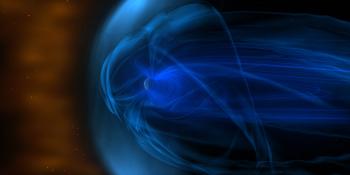Viewing archive of Saturday, 29 December 2001
Solar activity report
Any mentioned solar flare in this report has a scaling factor applied by the Space Weather Prediction Center (SWPC). Because of the SWPC scaling factor, solar flares are reported as 42% smaller than for the science quality data. The scaling factor has been removed from our archived solar flare data to reflect the true physical units.
Report of Solar-Geophysical Activity 2001 Dec 29 2200 UTCPrepared by the NOAA © SWPC and processed by SpaceWeatherLive.com
Joint USAF/NOAA Report of Solar and Geophysical Activity
SDF Number 363 Issued at 2200Z on 29 Dec 2001IA. Analysis of Solar Active Regions and Activity from 28-2100Z to 29-2100Z
Solar activity was high. The long duration X-flare,
which was in progress at the beginning of the period, ended at
29/2132 UTC. This impressive X3.4 east limb event (located near
S23) was accompanied by a 1600 sfu tenflare, type-II radio sweeps,
and bright post-flare loops visible in H-alpha and EIT imagery for
several hours following the event. A large CME was also evident in
LASCO imagery, with an estimated plane-of-sky velocity reported at
2170 km/s. Other activity included a west limb CME, with an M9.3
x-ray enhancement peaking at 29/0945 UTC, and associated type-II and
type-IV radio sweeps. An associated subfaint optical flare was also
observed from Region 9748 (S11W90), but is presumed to be only a
sympathetic indicator of the bulk of the activity from an apparent
nearby source region behind the west limb. Several other M-class
flares occurred throughout the period, though most were optically
uncorrelated and presumed to be from limb sources, except for an
M1/1f from Region 9751 (N04W38) at 29/0545 UTC.
IB. Solar Activity Forecast
Solar activity is expected to persist
at moderate to high levels for the next three days.
IIA. Geophysical Activity Summary 28-2100Z to 29-2100Z
The geomagnetic field was quiet to active. An L1 shock passage was
observed at approximately 29/0440 UTC, and followed by a sudden
impulse of 44 nT at 29/0538 UTC. Predominantly northward IMF
orientation following the shock passage mostly mitigated the
potential geomagnetic response to this event, presumed to have
originated from the CME activity of 26 December. The 10 MeV
integral proton flux at geosynchronous orbit followed a slow rising
trend shortly after the end of the east limb X-flare, and exceeded
event threshold at 29/0510 UTC. Further enhancement in possible
association with the shock passage resulted in a peak flux
observation of 76 pfu at 29/0815 UTC, and the event remains in
progress.
IIB. Geophysical Activity Forecast
Geomagnetic field activity is
expected to be mostly quiet to unsettled for the next 24-48 hours.
Increased activity with possible minor storming is expected on 31
December and 1 January, due to model predictions of a trailing flank
shock passage from the east limb X-flare event discussed in section
1A above.
III. Event Probabilities 30 Dec to 01 Jan
| Class M | 80% | 80% | 80% |
| Class X | 10% | 10% | 10% |
| Proton | 20% | 10% | 10% |
| PCAF | yellow | ||
IV. Penticton 10.7 cm Flux
Observed 29 Dec 264 Predicted 30 Dec-01 Jan 255/255/250 90 Day Mean 29 Dec 218
V. Geomagnetic A Indices
Observed Afr/Ap 28 Dec 009/005 Estimated Afr/Ap 29 Dec 013/011 Predicted Afr/Ap 30 Dec-01 Jan 010/008-015/015-020/020
VI. Geomagnetic Activity Probabilities 30 Dec to 01 Jan
| A. Middle Latitudes | |||
|---|---|---|---|
| Active | 15% | 20% | 30% |
| Minor storm | 05% | 10% | 15% |
| Major-severe storm | 02% | 02% | 05% |
| B. High Latitudes | |||
|---|---|---|---|
| Active | 15% | 25% | 35% |
| Minor storm | 05% | 10% | 20% |
| Major-severe storm | 01% | 01% | 05% |
All times in UTC
Latest news
Latest forum messages
Sunspot Latitudes at or near Solar Maximum 87Incoming & Unnumbered Active Regions 1810Some topics keep crashing the app 3Ask your obscure/"stupid" space weather questions. 384Space Weather Memes 703
More topicsSupport SpaceWeatherLive.com!
A lot of people come to SpaceWeatherLive to follow the Sun's activity or if there is aurora to be seen, but with more traffic comes higher server costs. Consider a donation if you enjoy SpaceWeatherLive so we can keep the website online!

Space weather facts
| Last X-flare | 2025/03/28 | X1.1 |
| Last M-flare | 2025/04/22 | M1.3 |
| Last geomagnetic storm | 2025/04/21 | Kp5+ (G1) |
| Spotless days | |
|---|---|
| Last spotless day | 2022/06/08 |
| Monthly mean Sunspot Number | |
|---|---|
| March 2025 | 134.2 -20.4 |
| April 2025 | 122.8 -11.4 |
| Last 30 days | 119.6 -11.6 |


